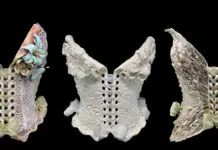If you enjoy this story, you have Samantha Powell and her mother, Leigh Powell, to thank. A student in one of my American Studies classes on Oklahoma music and movies at OSU’s Tulsa campus, Samantha brought a Capitol Records album titled Oklahoma to school one night. It belonged to her mother, who had purchased the disc the year it came out – 1977 – while attending OSU in Stillwater.
I was stumped. Even though I’ve written about our state’s music for somewhere around three decades, I’d never heard of this band. (It’s instances like this that keep you from thinking too highly of yourself and your “expertise.”)
The liner notes told me that the production end was handled by a couple of West Coast heavyweights: Terry Melcher – who produced the Byrds, The Mamas and The Papas and Paul Revere and the Raiders, among many other acts – and Mark Lindsay, the vocalist on all of Paul Revere and the Raiders’ ‘60s hits, as well as a successful early ’70s solo artist. As far as I knew, neither Melcher nor Lindsay had any ties to our state.
Here was a mystery that demanded answers. And luckily, I found just the guy who could provide them. He’s guitarist-vocalist-songwriter Steve Crossley, formerly of the band Oklahoma, who’s still a busy performer in and around Oklahoma City. Engaging and upbeat, he seemed happy to talk about the group and its brief turn on the national stage.
Interestingly, Crossley says that Oklahoma’s formation was tied to the end of another major-label act from the Sooner State – Buckwheat, a group out of Erick, Okla., that recorded four albums for London Records in the late ‘60s/early ‘70s. Its personnel included a young woman who would become one of Tulsa’s best-known pop vocalists, the late Debbie Campbell, along with her then-husband, Dub Campbell.
In the mid-‘70s, after Buckwheat split up, “their drummer, Sonny Ray Griffiths, came back to Oklahoma City, supposedly looking for a replacement band for London Records,” Crossley remembers. “So I moved out to L.A. with him. We got a house gig in Costa Mesa at the Lucky Lion, and Dub Campbell came down and saw the band and was interested in playing with us. He plays great fiddle and guitar. So he signed up with us.”
Unfortunately, London Records didn’t make a deal with the group, and neither did any other record company. Although the band, dubbed Pearly Hawkins, was getting plenty of work on the West Coast, Crossley opted to return to Oklahoma City, where he soon joined another rock outfit, Ringes. After several personnel changes, Ringes would become Oklahoma.
“The original Ringes members were Dwight Trahern on drums, Ben Blakemore on bass and vocals, Danny White on vocals and percussion, Speedy West Jr. on guitar, Joe Intrieri on keys, and myself, with Michael Slack and Lynn Bailey as our sound engineers,” Crossley says.
“We made a demo, and I played it for Dub. Dub knew Mark (Lindsay) and got it to him somehow, and then Mark and Terry Melcher came and saw us. They really liked it, went back to L.A., and brought Mike Curb back with ‘em. We did a showcase for Mike at the old Long Branch Saloon in Oklahoma City. They were excited and signed us to a deal.
“Whenever they got the money to do the deal,” he adds, “they moved back here (to Oklahoma City) for about a month, and we cut that stuff over at the old Producers Workshop, most of it. Curb was just starting Curb Records at that time, and he subbed us out to Capitol.”
While Curb (who’s not credited on the disc) was on his way to becoming a famous music-business executive, and Melcher was a very well-known producer, the star name in the production team belonged to Lindsay, the voice on such rock ‘n’ roll classics as “Kicks” and “Hungry.”
At the time of his affiliation with Ringes, Lindsay’s last charted single as a solo act was several years behind him (although he continues to tour and record to this day). For Oklahoma, he was all over the place, not only co-producing, but also singing background vocals, engineering and mixing the record.
“Oh, he was really working hard,” recalls Crossley. “He’d quit refined sugar, gotten on this hopped-up diet, and he had a lot of energy. The neat thing was that when those guys came back here for a month, staying at the house of a friend of ours, we got to know them pretty well, and pretty quickly. We became pretty good buddies. It was cool.”
But the producers also made some changes, cutting the band to four members: Crossley, Blakemore, guitarist Don Juntunen (who also continues to perform music around Oklahoma City) and drummer Sam Flores. They also changed the name of the group “because they thought Ringes sounded too much like Wings,” Crossley notes with a chuckle. He believes the new moniker may also have been influenced by the band Kansas, which was becoming hot at the time.
Unfortunately, nothing similar happened with Oklahoma. Capitol released a single from the disc, the Crossley-penned “What You Treat Me So Bad For,” and then the album; neither made much of a showing. Talk of a national tour fizzled, and Oklahoma played only a handful of dates.
As often happens in these sorts of situations, frustration and unmet expectations led to friction within the group, and Crossley left after a New Year’s Eve date in Oklahoma City at the end of 1977. Although the band went on for a while with replacement members, including Steve Hardin, the noted keyboardist and songwriter from Bartlesville, Capitol Records soon dropped the act and it broke up for good.
“You know how it is, with egos and everything,” says Crossley with another chuckle. “It just goes from, ‘We’re on top of the world’ to ‘Hey, man! You’re not playing the right notes!’ Some of the guys kind of got ‘egoed’ out and thought it should have been way bigger than it was. I was lucky to know guys like Dub (Campbell) and Michael Smotherman, who’d already had major-label deals. If I had a question about something, I could call ‘em and say, ‘Here’s what’s going on,’ and they could tell me pretty much what to expect.”
Crossley ended up playing with Smotherman, another Buckwheat alumnus who went on to make his own significant mark in the industry. That job led to a songwriting and performing deal with Glen Campbell, and Crossley worked with a number of other music stars as well, returning to Oklahoma City for good in 1982, when his son, Steven, was born.
These days, he’s getting plenty of gigs both as a solo artist and with OKC bands like the Blue Cats and Hoppy Niles’ One-Armed Bandit. He even played a couple of jobs with Mark Lindsay when Lindsay’s touring brought him to the area. Obviously, Crossley harbors no ill feelings toward his former producer – or, it appears, about the one-off performance of Oklahoma as a big-time recording act.
“Because I was getting that advice (from Smotherman and Campbell),” he reflects, “I think I was a little bit cooler about it than some of the other guys. It was just hard for them to understand why the wheel wasn’t turning as fast as it should’ve been. I really didn’t know either, but I was a little bit more prepared, because I knew a little more about the reality of it.”

























